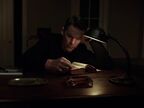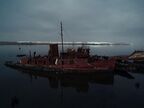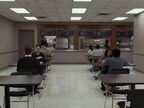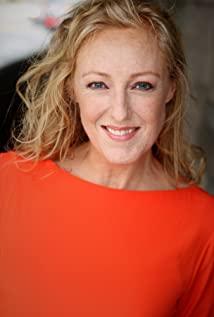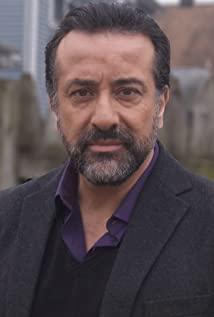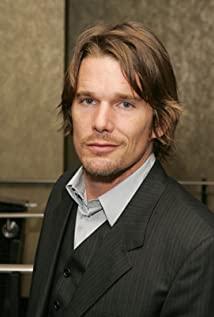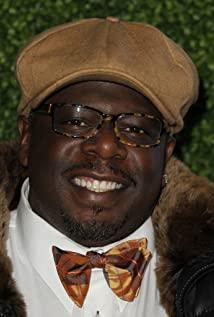Carrying out the paradox of the whole film, "A life without despair is a life without hope", the director did not infect the audience with sensationalism, but asked calm questions for us to figure out.
The director placed the time bomb of environmental issues on the doorstep of religion.
All religious schools to this day have never taken environmental protection seriously. Global warming and environmental damage are indisputable facts, and all the actions of human beings today will accelerate and force human civilization to the ultimate destruction. If the imminent demise of mankind is not enough for religion to pay attention to, what else should religion pay attention to?
This is a very bold provocation. As a Christian country, the United States has always been very sensitive to religious issues. And putting the more sensitive topic of warming in front of religion, I believe many Christians are very surprised. These two are important topics of great concern in American society, belief and environment, but the intersection of the two can rarely be found in the media and public opinion. That's why the film caused such a violent reaction in the United States, while it was tepid in China.
Father Toller's daily life, until he met pregnant Mary and her husband Michael, the priest's psychological activities began to change. Michael is an environmentalist. He expresses despair for the future and hates all the environmental damage done by human beings. "If I am sure that the future of the earth is hopeless, is there any meaning to my child's birth in the world?".
The priest explained it by "a life without despair is a life without hope" .
But until the priest is also on the side of the earth thinking about the problem, he complained to the priest Joel, "Somebody has to do something." life), assessing that he does not live in the real world. The priest did not explain himself with the same admonition "a life without despair is a life without hope" .
Michael's suicide triggers a tipping point for Father Toller's transformation. After Michael's death, the self-blaming priest had more serious alcohol problems, more obvious psychological problems, more alienation and indifference to those who cared about him, until finally the accumulated anger in his heart led him to extremes. He has been struggling with himself in his diary every day, struggling with his beliefs. His ultimate choice is to use blood to warn people of the truth that has been deceived.
No one in the real world would doubt that a Christian priest can go to the extreme of horror, or even imagine a priest wearing a bomb vest, and the film uses this strong contrast of ideas to attack the audience. Perhaps it is impossible to forget the scene where the father of the gods put on a bomb vest.
Environmental issues determine the future of our humanity. Instead of praying with our eyes closed, we should open our eyes and look around us.
There is a powerful force behind the scenes of the church in the movie. Capital can not only control the seating chart in the church, but also control the speech of people. An energy company accused of environmental pollution is able to win hearts by donating to churches. Destroying the earth created by God, but the money from what he did is used to donate to the church, which is very ironic. Humans have no less faith in money than they do in God.
Father Toller thought faith would give him the right answer. But there are actually a lot of questions, and standing at the intersection, he doesn't know what the correct answer is. Michael asked him "Will God forgive us?" Balq asked him "Did God tell you what he planned for the earth?" Joel asked him "What if this is God's plan?" The priest didn't answer. .
Religious beliefs have not kept pace with more pressing issues, and the planet’s environmental problems have no truth in the Bible. The earth is as morbidly ill as the priest, and equally disregarded by capitalism. The montage shots interspersed in the middle gradually transition from the natural landscape of the earth to the rampant human industrial civilization. The brutal imagery makes viewers think that this is exactly what we humans do to the planet every day.
After watching the movie, you should have questions and doubts. Maybe the director didn't want to instill any conclusion into the audience, instead he wanted to open up the film and leave enough space for the audience to reflect on the paradoxes that appear in the film. For example, to implement the paradox of the whole film, "A life without despair is a life without hope", the director did not infect the audience with sensationalism, but asked calm questions for us to figure out.
From the outside in the daytime, he is a determined Christian, a trusted and reliable priest, and a father who has lost his son. At night, he can be seen from the inside as a patient with stomach cancer who refuses to be treated, a middle-aged divorced with alcoholism, and a lonely man who is unwilling to open himself up. The film allows us to see the inside and outside of this priest.
He is calm, intelligent, and dependable in society. When he was alone in the room, he would show rage, confusion, depression, and even self-denial. He insisted on writing a diary to face himself at night. Only by facing the diary can he be absolutely honest.
This is the Ethan Hawke I've never seen before, playing a priest whose heart has changed from a firm belief to a challenge to it, a priest who is going to the extreme end. There is no precedent for him to use as a reference, and it is difficult to find such extreme examples in reality. It is necessary for the actor to speculate on the psychological evolution of the character in the script to create such a calm and violent character. This is very demanding on the actor, and his struggle cannot be superficial pain, empty hysteria, or a painless cry.
Ethan Hawke's flawless performance from beginning to end is very touching, and this is his best work.
With a 4:3 aspect ratio, the entire film is shot with almost a fixed lens, without any movement. This approach to modern art adds a surreal feel to the film, reminiscent of European cinema. The lens is always standing in the distance as an observer. The film is cool-toned, a serious story that doesn't need fancy polish. Beneath the calm surface, there is actually a dark surging that is difficult to calm down.
There are two shots I really like, the one where the pink stomach medicine is poured into the whiskey and the other where the dredge is poured into the glass. One is cloudy and beautiful, the other is clear and viscous.
View more about First Reformed reviews



